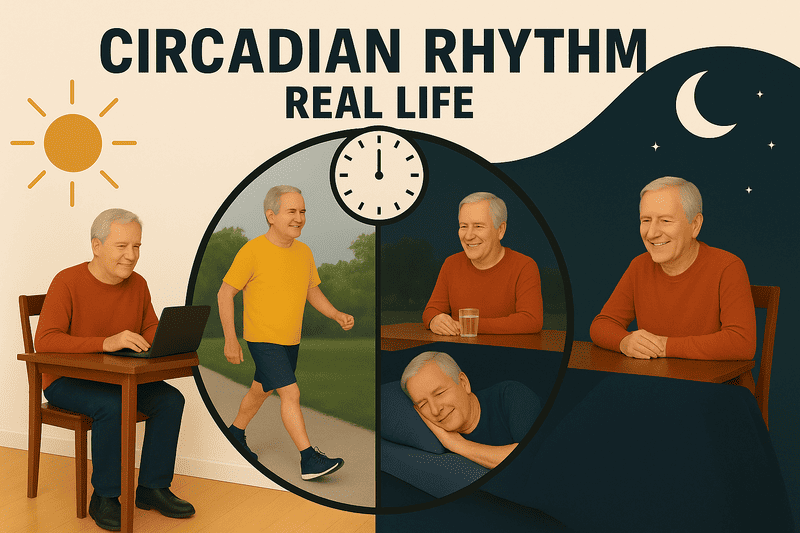Ever wonder why you wake up at 4 am now, or feel completely drained by early afternoon?
It may not be just getting older. It could be your body’s internal clock falling out of sync.
That clock isn’t just poetic—it’s biological. And it governs much more than your sleep. It sets the rhythm for your hormones, metabolism, immune response, and even your mood and energy. After 55, keeping that rhythm aligned becomes more than just a good idea. It becomes essential for aging well.
That’s the insight behind a growing body of research and the mission of Lume Health, a company leading the charge in circadian wellness. In a recent interview, their team shared how understanding and resetting your body’s internal rhythm can transform how you age.
What Are Circadian Rhythms?
Circadian rhythms are 24-hour cycles built into every cell in your body. They’re set by your brain’s master clock, located in an area called the suprachiasmatic nucleus (SCN). You can think of it as your body’s central timekeeper that responds to light. These rhythms regulate everything from when you feel alert to how your organs function, and they’re incredibly sensitive to disruption.
Think of it as your body’s operating system. When it’s well-tuned, everything works in harmony. When it’s off, systems start to lag, energy dips, sleep gets disrupted, mood changes, and inflammation rises.
“We’re learning that even subtle disruptions to the circadian system, like delayed light exposure or irregular meal times, can have measurable effects on hormone levels and immune function, especially as we age,” explains Dr. Jonathan Moustakis, Co-founder and CTO of Lume Health.
Why It Matters More After 55
As we age, circadian rhythms naturally become more fragile. The signals that help keep us in sync—like early exposure to bright light or consistent mealtimes—tend to fade. Add in lifestyle shifts, less time outside, or changes in health, and your body’s internal clock can lose its rhythm.
That’s when symptoms begin to show up: fatigue, insomnia, metabolic changes, weakened immunity, and for many women, intensified menopause symptoms.
The Menopause Connection
Menopause is a major hormonal shift, and hormones are tightly linked to your circadian rhythm. Estrogen, for example, affects how your body responds to light, regulates body temperature, and even helps you sleep soundly.
Studies have found that women going through menopause often experience a delayed or flattened cortisol rhythm. This is the hormone that helps you wake up and feel alert. At night, melatonin levels may dip or mistime, leading to restless sleep and that frustrating “tired but wired” feeling.
You’re not alone. These shifts are extremely common, and understanding how your internal rhythm interacts with your hormones can be the key to feeling better.
Simple Ways to Support Your Body’s Clock
(No Tech Required)
The good news is that circadian rhythms can be reset. The Lume Health team shared a few simple, science-backed ways to support your rhythm:
- Soak up morning light. Try a short walk or gentle stretches by a sunny window within 30 minutes of waking.
- Keep sleep and meal times consistent. Even on weekends, regular timing helps your body find its rhythm.
- Dim lights after sunset. That includes screens. Switch to warmer tones or night mode to signal your body it’s time to wind down.
- Move during the day. A bit of movement in the morning can boost your mood and help reset your internal clock.
These may seem small, but they add up. Even subtle shifts can lead to deeper sleep, steadier energy, and more ease throughout your day.
As always, check with your doctor before starting any new routines, especially if you have existing health concerns.
If you’re looking for support in tracking your rhythm, the Lume App offers personalized prompts and tools that help you build better circadian habits. From light tracking to scheduling suggestions, it’s designed to make rhythm reset feel doable, not overwhelming.
“Circadian health is incredibly empowering once people understand it. You start seeing how your biology works for you, not against you, and that’s where real change begins,” says Vicki Powell, CEO and Co-founder of Lume Health.
Looking Ahead:
More than ever, researchers are uncovering the powerful connection between circadian health and how we age. Your body’s natural rhythm may hold the key to more energy, deeper sleep, stronger immunity, and a smoother transition through midlife and beyond.
If you’ve felt “off” lately, waking too early, dragging through the day, or wired at night, you’re not alone. And more importantly, it’s not just something you have to live with. Small, steady changes can help your body find its rhythm again, bringing more ease and energy to your everyday life.

Lume Health is building the first real-time hormone monitor to make invisible rhythms, like cortisol and melatonin, finally visible. They help people get back in sync with their biology to sleep better, feel more energetic, and age with strength. Through expert insights and tools like the Lume App, their mission is to bring circadian health into everyday life in a way that’s personalized, empowering, and grounded in science.
- Website: https://www.lumehealth.io





